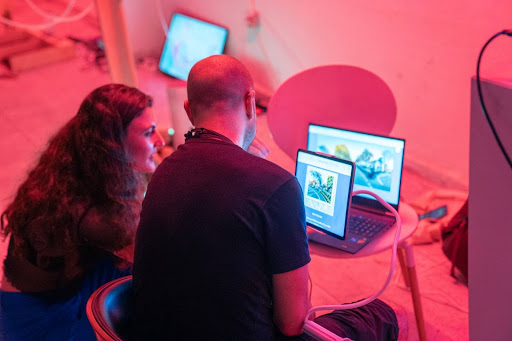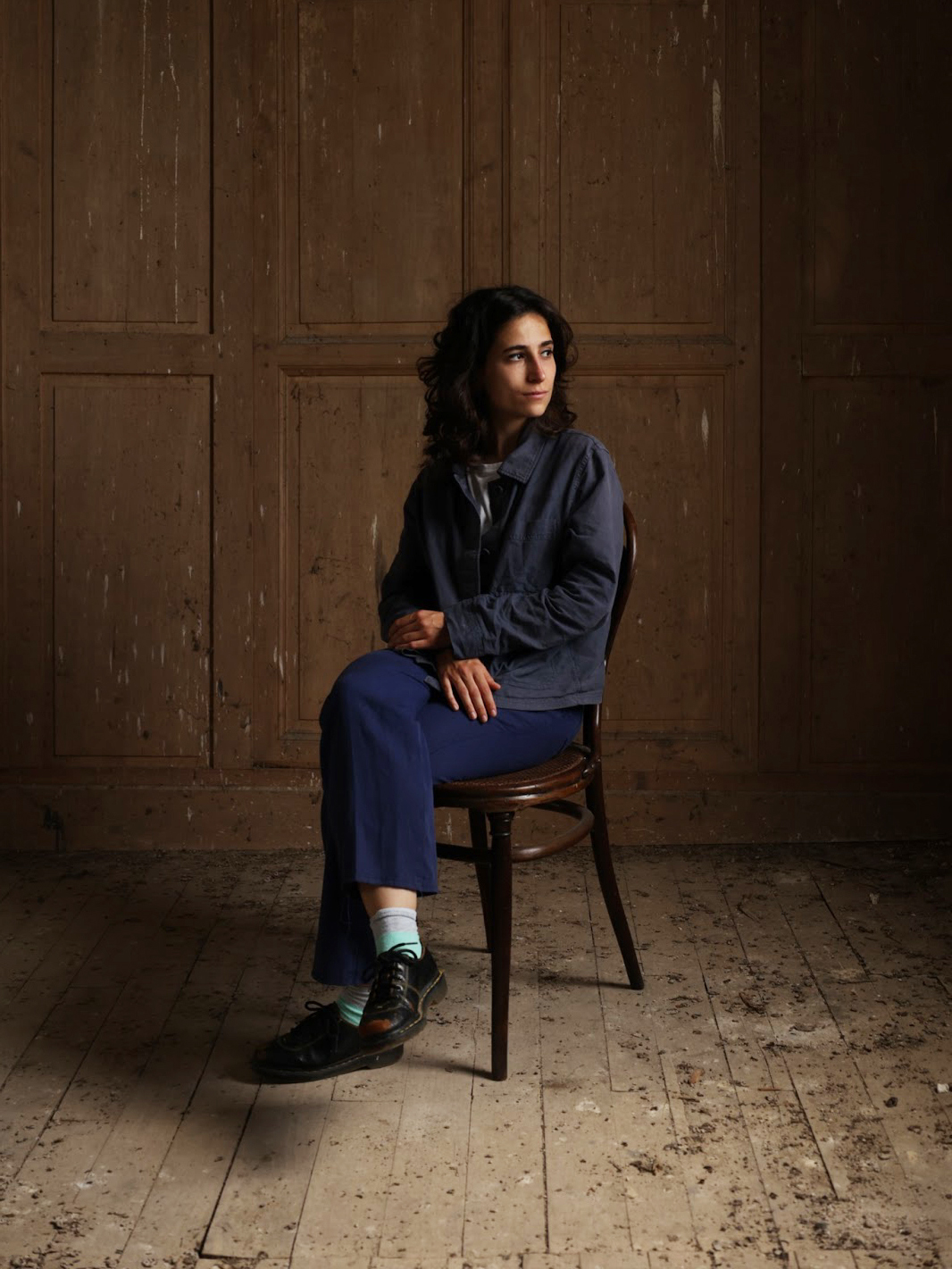Syllabus⇝
The Thesis Project course is designed to support and guide students through the process of developing their final design projects during the second year of the Master in Design for Emergent Futures. Throughout the academic year, students will engage in three key phases: Implementation, Validation, and Dissemination—each building on the prior to ensure that the project is well-researched, contextually grounded, and capable of being scaled for real-world impact. The course emphasizes interdisciplinary research, design methodologies, field engagement, and the creation of sustainable business models.
By the end of the course, students will have created a fully developed, scalable, and contextually situated project that reflects their ability to address complex societal challenges with innovative, emergent design solutions.
Keywords: Prototyping, 1st Person Research through Design, Design Space, Documentation and Communication, Design Interventions, Alternative Presents
Learning Objectives⇝
The specific goals are the following:
-
Develop advanced research skills to investigate and establish the scientific background of design projects, specifically focusing on the integration of emerging technologies and their impact on societal, cultural, and environmental contexts in order to develop their projects and practices as Alternative Presents to current challenges.
-
Apply theoretical frameworks and methodologies to inform the design process and address complex challenges in emergent futures, with a particular emphasis on the ethical and sustainable integration of emerging technologies, situating their practices from a first-person perspective critically assessing scalable socio-technical systems.
-
Gain an understanding of the social, cultural, and environmental aspects that influence design implementation within specific communities and contexts, considering the potential implications and effects of emerging technologies on these factors.
-
Promote design interventions encompassing field research and participatory methods to gain insights into the needs, aspirations, and challenges in the context exploring how these can be leveraged to create positive social impact
Schedule⇝
In the first term, students will focus on conducting research and establishing the scientific background of their projects. They will delve into relevant theories, methodologies, and frameworks to inform their design process. Students will gain a solid understanding of the context and theoretical foundations of their projects.
Specific Learning Objectives
- Develop advanced research skills to investigate and establish the scientific background of design projects, specifically focusing on the integration of emerging technologies and their impact on societal, cultural, and environmental contexts in order to develop their projects and practices as Alternative Presents to current challenges.
- Apply theoretical frameworks and methodologies to inform the design process and address complex challenges in emergent futures, with a particular emphasis on the ethical and sustainable integration of emerging technologies, situating their practices from a first-person perspective critically assessing scalable socio-technical systems.
Milestones
- Research Proposal: A document outlining the theoretical framework, research questions, and methodologies that will guide their project.
- Annotated Bibliography: A detailed analysis of at least 10 academic and field-relevant resources related to their topic.
Specific Evaluation Methods
- Framework assessment: Evaluate proposals based on clarity, depth of research, and alignment with course objectives.
- Design Dialogues I: Demonstrate comprehension and application of research to inform the design process in the format of Design Dialogues.
During the second term, students will shift their focus to situating their projects within a specific community and context. They will explore the social, cultural, environmental, political, and economical aspects that influence the development and implementation of their designs. Students will gain insights into the needs, aspirations, and challenges of the community they aim to serve.
Specific Learning Objectives
- Gain an understanding of the social, cultural, environmental, political, and economical aspects that influence design implementation within specific communities and contexts, considering the potential implications and effects of emerging technologies on these factors.
- Build a solid foundation for engagement by critically analyzing the feasibility and relevance of planned interventions and subsequent analyses within a specific context.
- Promote design interventions encompassing field research and participatory methods to gain insights into the needs, aspirations, and challenges in the context exploring how these can be leveraged to create positive social impact.
Milestones
- My Community of Practice: Motivation, Commitment and Context: A reflective report detailing the motivations, commitment, and engagement with the student’s contextualised and territorialised community of practice. It should address situated qualities and criteria to developing their community, including what is shared and not shared with them, and the potential contributions to be made.
- Field Research Report: An account of the interventions and methods performed to engage a community of practice. Documented insights gained from the interventions and community engagement activities.
- Prototype Testing and Feedback Analysis: A report on the feedback and iterations of a prototype (or prototypes) tested with the community of practice.
Specific Evaluation Methods
- Feedback sessions: Assessment based on the depth of community involvement, effectiveness, and diversity.
- Design Dialogues II: Showcase design validation and iteration processes, evaluated on alignment with contextual challenges and needs.
In the final term, students will work on the scalability model of their projects. They will explore strategies for scaling up their designs to reach a wider audience and have a greater impact. Additionally, students will develop sustainability and viability strategies for their projects. They will consider factors such as funding, partnerships, and distribution to create a comprehensive plan for implementing their designs.
Specific Learning Objectives
- Enable students to create actionable plans for scaling their projects, considering contextual, technical, and community factors to develop a scalable implementation strategy.
- Guide students in designing a sustainable model integrating funding strategies, partnerships, and distribution mechanisms into their projects, ensuring long-term viability and resilience of their solutions.
Milestones
- Sustainability Plan: A comprehensive plan detailing the steps required to ensure the long-term viability of the project, including technical iterations, resource allocation, and community engagement, integrating an academic, communitarian, or economic framework (or a hybrid model).
- Ways of Drifting: A written document identifying and analyzing frictions encountered during the dissemination phase. It will report on how external critiques, regulatory challenges, unforeseen adaptations by new audiences, emergence of new opportunities, etcetera have impacted on the development of their journey in MDEF02. Ways of Drifting can be used as a framework to reflect on the student’s evolution.
- Thesis Project
Specific Evaluation Methods
- Feedback sessions: Sustainability strategies presented in the form of Design Crits to peers, faculties, mentors and the community of practice.
- MDEFest: Presentation in the form of an event to external actors (from academia, industry, and/or community stakeholders) demonstrating the project’s potential, sustainability, and the ability to present Alternative Presents.
Methodological Strategies⇝
-
Lectures & Seminars: Weekly sessions on advanced research methods, design theories, community engagement techniques, and business modeling.
-
Advisory Sessions: Meetings with academic advisors to provide personalized feedback and guidance on project development.
-
Peer Reviews & Presentations: Group critiques and feedback sessions to foster collaborative learning and refine project ideas.
-
Fieldwork: Practical fieldwork to engage with communities and gather insights for project validation.
Grading Method⇝
These are the points we are going to look at:
- Relevance of the project in relation to students’ positionality, situated contexts, and emerging challenges.
- Framing and documenting the design opportunity of the thesis
- Development and involvement of a community of practice
| Percentage | Description |
|---|---|
| 50% | Faculty - Including first Thesis draft |
| 50% | Self-Evaluation |
European Credit Transfer and Accumulation System (ECTS)
17 ECTS over three terms:
- Term 1: Implementation (5 ECTS)
- Term 2: Validation (5 ECTS)
- Term 3: Dissemination (Scale and Distribute) (7 ECTS)
Additional Resources⇝
Auger, J. (2010). ‘Alternative presents and speculative futures: Designing fictions through the extrapolation and evasion of product lineages’. Negotiating futures – Design Fiction. 42–57.
Candy, S., & Dunagan, J. (2017). ‘Designing an experiential scenario: The People Who Vanished.’ Futures, 86, 136–153.
Diez, T., & Tomico, O. (2020). ‘The Master in Design for emergent futures.’ IAAC. Hiltunen, E. (2010). Weak signals in organizational futures learning. Doctoral thesis. Helsinki: Aaalto University.
Krogh, P., Markussen, T., & Bang, A. (2015). ‘Ways of drifting – 5 methods of experimentation in research through design’. In Proceedings of ICoRD’15 – Research into Design Across Boundaries Volume 1. New Delhi. Springer. 39–50.
Lucero, A., Desjardins, A., Neustaedter, C., Höök, K., Hassenzahl, M., & Cecchinato, M. (2019). ‘A sample of one: First-person research methods in HCI’. In Companion Publication of the 2019 on Designing Interactive Systems Conference 2019 Companion (DIS ‘19 Companion). ACM: New York. 385–388.
Neustaedter, C., & Sengers, P. (2012). Autobiographical design: what you can learn from designing for yourself. Interactions, 19(6), 28–33.
Rosenberg, D. (2015). Transformational Design: A mindful practice for experience-driven design. PhD Thesis. Cambridge: Massachusetts Institute of Technology.
Tomico, O., Winthagen, V. O., & van Heist, M. M. G. (2012). Designing for, with or within: 1st, 2nd and 3rd person points of view on designing for systems. In Proceedings of the 7th Nordic Conference on Human-Computer Interaction: Making Sense Through Design (NordiCHI '12). Association for Computing Machinery, New York, NY, USA, 180–188.
Varela, F. J., & Shear, J. (1999). First-person Methodologies: What, Why, How? Journal of Consciousness Studies, 6(2-3), 1-14.
Wakkary, R. (2021). Things We Could Design: For more than human-centered worlds. Cambridge: The MIT Press.
Wensveen, S. A. G., & Matthews, B. (2015). Prototypes and prototyping in design research. In P. Rodgers & J. Yee (Eds.), Routledge companion to design research (pp. 262–276). London: Routledge.
More to be provided along the course
Faculty⇝
As a designer and researcher with a strong focus on sustainable practices and innovative design methodologies, Jana is committed to questioning and challenging the field of design. By continuously striving for movement and positive change, she puts sustainability, innovation, and care at the forefront of her work — which is always underpinned by post-humanist and feminist materialist thought. In her design practice, Jana’s work is community-driven and collaborative, working with other designers and artists to create thought-provoking installations and experiences.
Roger Guilemany is a founding member of the design cooperative aqui, where he contributes, through action research, to processes of ecosocial transition and the praxis of participatory design. As an independent researcher, he is interested in relationships and collaborative processes of situated production. With his design practice, he also collaborates with commoning projects and other self-governance structures.


